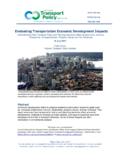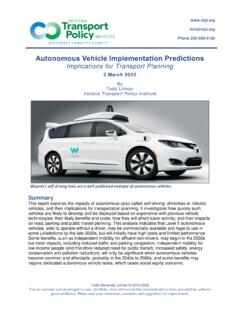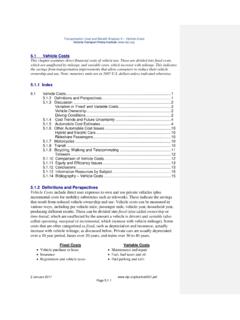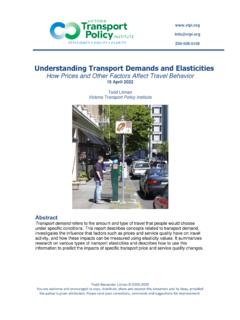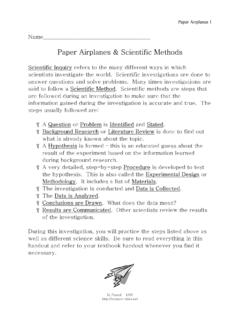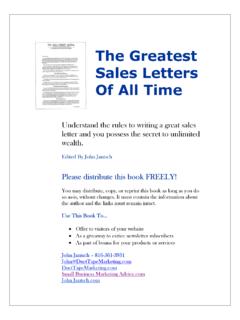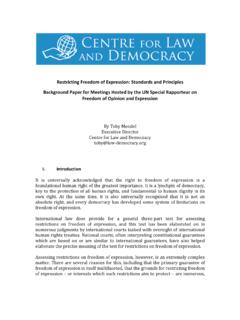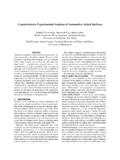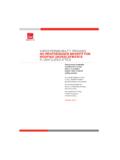Transcription of Guidelines for Scholarship - vtpi.org
1 250-360-1560 2005-2012 Todd Alexander Litman All Rights Reserved Evaluating Research Quality Guidelines for Scholarship 22 February 2012 By Todd Litman Victoria Transport Policy Institute Portrait of a Scholar by Domenico Feti, Italian painter (b. ca. 1589, Roma, d. 1623, Venezia) Oil on canvas, 98 x 73,5 cm, Gem ldegalerie, Dresden Abstract This paper discusses the importance of good research, discusses common causes of bias, provides Guidelines for evaluating research and data quality, and describes examples of bad research. A version of this paper was presented at the International Electronic Symposium on Knowledge Communication and Peer Reviewing, International Institute of Informatics and Systemics ( ), 2006.
2 Evaluating Research Quality Victoria Transport Policy Institute 2 Everyone is entitled to his own opinion, but not his own facts. -attributed to Senator Patrick Moynihan Introduction Research (or Scholarship ) investigates ideas and uncovers useful knowledge. It is personally rewarding and socially beneficial. But research can be abused. Propaganda (information intended to persuade) is sometimes misrepresented as objective research. This is disturbing to legitimate scholars and harmful to people who unknowingly use such information. It is therefore helpful to have Guidelines for evaluating research quality. Some people have few qualms about manipulating research. They consider it a game, assuming that all sides abuse information equally, or that a desired outcome justifies misrepresentation.
3 But distorted research causes real harm and deserves strong censure. Good research reflects a sincere desire to determine what is overall true, based on available information; as opposed to bad research that starts with a conclusion and only presents supporting factoids (individual facts taken out of context). A good research document empowers readers to reach their own conclusions by including: A well-defined question. Description of the context and existing information about an issue. Consideration of various perspectives. Presentation of evidence, with data and analysis in a format that can be replicated by others. Discussion of critical assumptions, contrary findings, and alternative interpretations.
4 Cautious conclusions and discussion of their implications. Adequate references, including original sources, alternative perspectives, and criticism. Good research requires judgment (or discernment) and honesty. It carefully evaluates information sources. It acknowledges possible errors, limitations and contradictory evidence. It identifies excluded factors that may be important. It describes key decisions researchers faced when structuring their analysis and explains the choices made. For example, if various data sets are available, or impacts can be measured in several ways, the different options are discussed. Sometime, multiple analyses are performed using alternative approaches and their results compared.
5 Good research is cautious about drawing conclusions, careful to identify uncertainties and avoids exaggerated claims. It demands multiple types of evidence to reach a conclusion. It does not assume that association (things occur together) proves causation (one thing causes another). Bad research often contains jumps in logic, spurious arguments, and non-sequiturs ( it does not follow ). Bad research often uses accurate data, but manipulates and misrepresents the information to support a particular conclusion. Questions can be defined, statistics selected and analysis structured to reach a desired outcome. Alternative perspectives and data can be ignored or distorted. Critics of an idea sometimes exaggerate issues of uncertainty.
6 They imply because we don t know everything about an issue, we know nothing about it. Evaluating Research Quality Victoria Transport Policy Institute 3 A good research document provides a comprehensive overview of an issue and discusses its context. This can be done by referencing books and websites with suitable background information. This is especially important for documents that may be read by a general audience, which includes just about anything that will be posted on the Internet. Good research may use anecdotal evidence (examples selected to illustrate a concept), but does not rely on them to draw conclusions because examples can be found that prove almost anything. More statistically-valid analysis is usually needed for reliable proof.
7 Peer review (critical assessment by qualified experts, preferably blind so reviewers and authors do not know each others identify) enhances research quality. This does not mean that only peer reviewed documents are useful (much information is distributed in working papers or reports), or that everything published in professional journals is correct (many published ideas are proven false), but this process encourages open debate about issues. Consider researchers ideological and financial interests when evaluating their analysis. Proponents of a perspective may provide asymmetrical (one-sided) information, offering evidence that supports their conclusions while ignoring or suppressing other information.
8 Their conclusions are not necessarily false, much legitimate research is supported interest groups, but it is important to evaluate such analysis critically and investigate other information sources that may provide alternative perspectives and results. Research quality is an epistemological issue (related to the study of knowledge). It is important to librarians (who manage information resources), scientists and analysts (who create reliable information), decision-makers (who apply information), jurists (who judge people on evidence) and journalists (who disseminate information to a broad audience). These fields have professional guidance to help maintain quality research. This has become increasingly important as the Internet makes unfiltered information more easily available to a general audience.
9 Guidelines for good research are provided below. Additional information is available from references cited at the end of this paper. On Bullshit In his best-selling book, On Bullshit (Princeton Press 2005), philosopher Harry G. Frankfort argues that bullshit (manipulative misrepresentations) is worse than an actual lie because it denies the value of truth. A bullshitter s fakery consists not in misrepresenting a state of affairs but in concealing his own indifference to the truth of what he says. The liar, by contrast, is concerned with the truth, in a perverse sort of fashion: he wants to lead us away from it. Truthtellers and liars are playing opposite sides of a game, but bullshitters take pride in ignoring the rules of the game altogether, which is more dangerous because it denies the value of truth and the harm resulting from dishonesty.
10 People sometimes try to justify their bullshit by citing relativism, a philosophy which suggests that objective truth does not exist (Nietzsche stated, There are no facts, only interpretations ). An issue can certainly be viewed from multiple perspectives, but anybody who claims that justifies misrepresenting information or denies the value of truth and objective analysis is really bullshitting. Evaluating Research Quality Victoria Transport Policy Institute 4 The greatest sin is judgment without knowledge Kelsey Grammer Research Document Evaluation Guidelines The Guidelines below are intended to help evaluate the quality of research reports and articles. Desirable Practices 1. Attempts to fairly present all perspectives.

